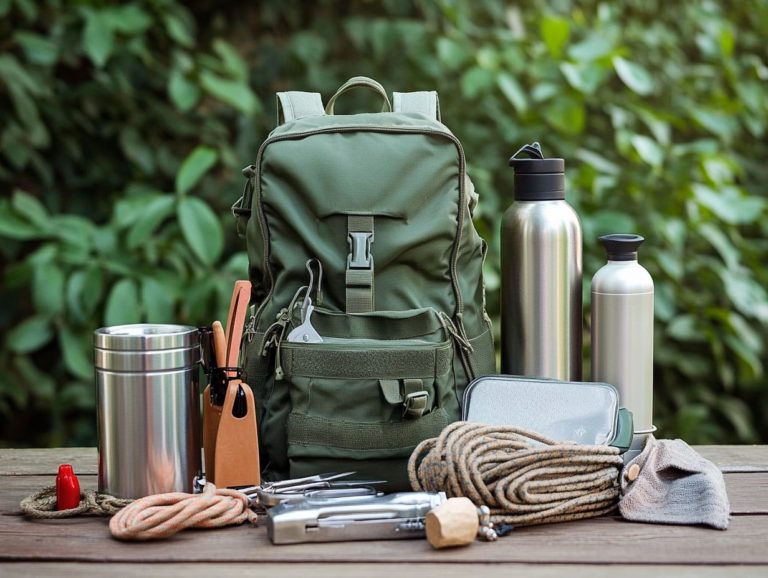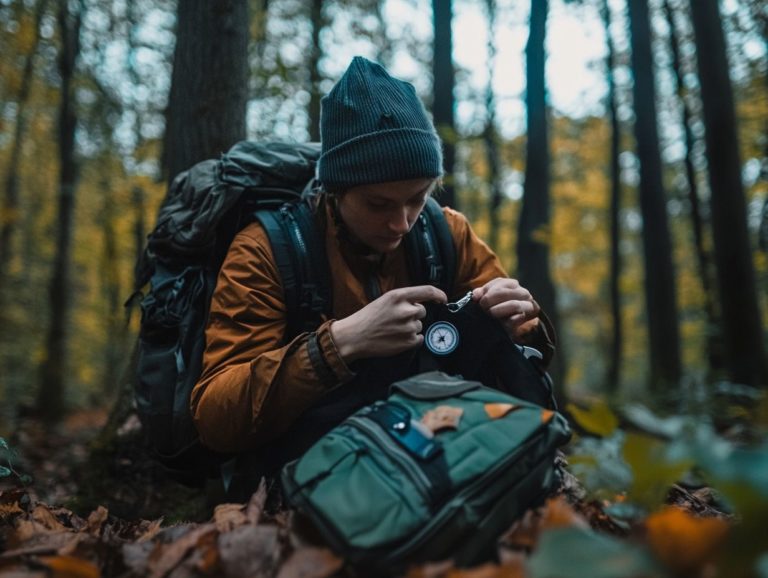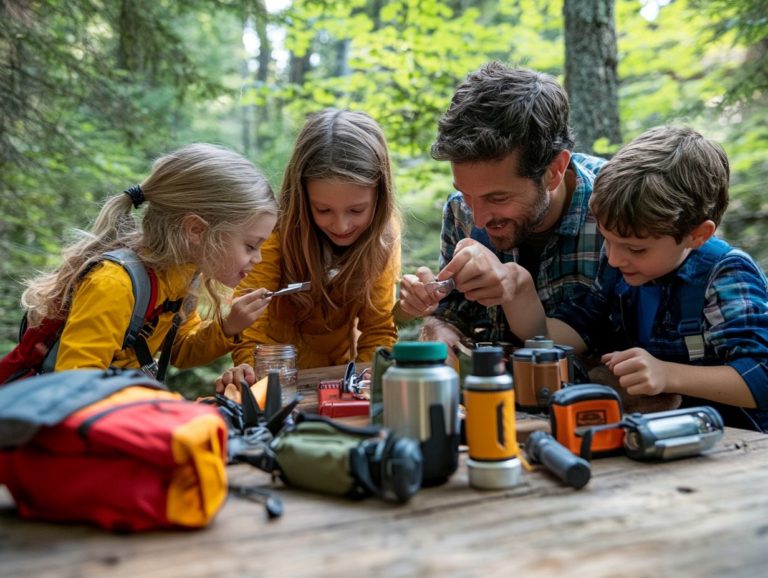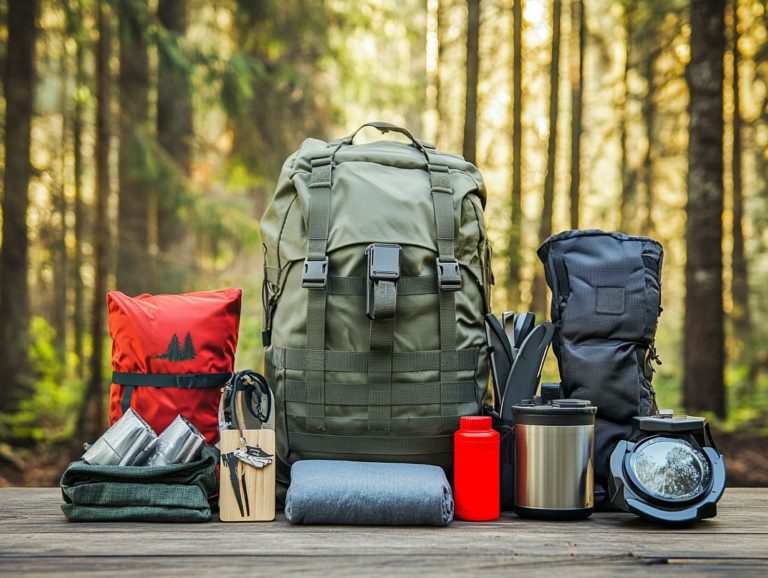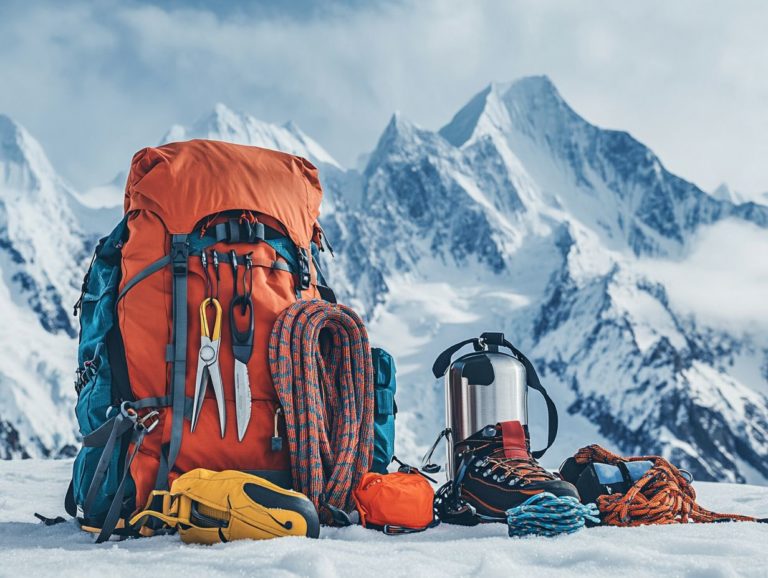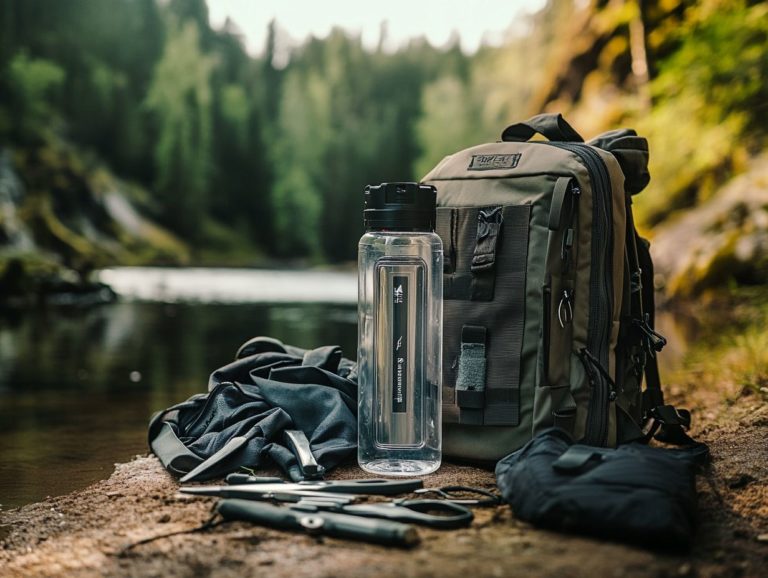How to Organize a Survival Gear Workshop
Organizing a survival gear workshop presents a unique opportunity to equip participants with essential skills while cultivating a strong sense of community. This is especially important when discussing topics like disaster supplies and outdoor camping.
This guide will help you plan and run a successful workshop, covering everything from choosing the ideal venue and setting a budget to designing engaging, hands-on activities that captivate attendees. We ll also consider emergency planning and how to organize different categories.
It also covers effective marketing strategies to draw in participants and highlights the importance of providing valuable follow-up resources. Get ready to empower your community through effective emergency preparedness strategies!
Contents
- Key Takeaways:
- Benefits of Organizing a Survival Gear Workshop
- Planning and Preparing for the Workshop
- Workshop Activities and Demonstrations
- Promoting and Inviting Participants
- Post-Workshop Follow-Up and Resources
- Frequently Asked Questions
- What is a survival gear workshop?
- Why should I organize a survival gear workshop?
- How do I choose the right location for a survival gear workshop?
- What activities can I include in a survival gear workshop?
- How can I ensure the safety of participants during the workshop?
- Do I need to provide all the survival gear for the workshop?
Key Takeaways:

- Gain practical skills and knowledge in emergency preparedness by attending a survival gear workshop, including how to efficiently assemble your emergency supplies.
- Build a supportive community and foster a sense of preparedness by organizing a workshop for survival gear.
- Maximize the success of your workshop by choosing the right venue, preparing a budget, and promoting the event effectively.
What is a Survival Gear Workshop?
A Survival Gear Workshop is an exceptional opportunity for you to dive into the world of emergency preparedness. This event goes beyond the usual lectures by emphasizing not just gathering essential supplies but also how to organize and manage them effectively within a Storage Area for Survival Gear, where you keep and organize your survival supplies.
You ll discover critical elements like emergency kit food, first aid essentials, and efficient packing techniques all tailored to sharpen your survival skills in various disaster scenarios.
Throughout the workshop, you ll engage in hands-on activities, such as assembling a comprehensive 299 Pc First Aid Kit, and honing vital skills like knot tying and fire starting skills that are invaluable when emergencies strike. Community involvement is at the heart of this event, fostering a collective sense of responsibility for safety and preparedness.
You ll also have the chance to explore must-have gear, including the versatile Swiss Army Knife, water purification tablets, and energy sources for various emergency scenarios. Engaging discussions on emergency planning and how to use resources will give you deeper insights into crafting a well-rounded survival strategy.
By the end of the workshop, you ll be equipped with both knowledge and practical experience, enabling you to navigate unforeseen circumstances with confidence.
Benefits of Organizing a Survival Gear Workshop
Organizing a Survival Gear Workshop presents a wealth of advantages, especially in fostering community connections and enhancing emergency preparedness. By gathering individuals who share a passion for survival skills and disaster response, participants can exchange knowledge and experiences. This significantly boosts their collective capability to tackle emergency situations.
These workshops offer hands-on training in assembling survival kits, crafting effective food storage plans, and mastering the essentials of packing an emergency kit. For the best tools and equipment, participants can explore the best survival gear for outdoor workshops. These activities maximize organizational efficiency during a crisis.
Community Building and Preparedness
Community building is at the heart of a Survival Gear Workshop. It enables collaboration and shared learning among participants, helping to build a prepared community for future emergencies.
When you discuss essential topics like emergency communication equipment, family survival kits, and organizing resources in a Survival Closet such as storage bins and clothing supplies you forge stronger bonds and a collective understanding of what it truly means to be prepared.
This collaborative atmosphere nurtures trust and encourages sharing personal experiences, challenges, and triumphs related to past emergencies.
Through hands-on demonstrations and role-playing scenarios, you can hone your practical skills, equipping yourself to handle real-life situations with confidence.
Workshops also broaden your community s network of available resources. You ll discover local shelters, first aid supplies, and ways to access emergency services. Ultimately, these gatherings enable you to prepare yourself and mobilize your entire community when it matters most, reinforcing resilience in the face of adversity.
Planning and Preparing for the Workshop
Planning a Survival Gear Workshop requires meticulous attention to logistics, materials, and the distinct needs of your attendees. Focus on organizing the workspace for effective emergency preparedness.
Select a suitable venue that sets the right tone. Gather essential prepping supplies, including emergency gear, durable survival gear, and general survival equipment.
Each detail plays a vital role in effective emergency preparedness. Consider the unique interests of your participants and what skills and knowledge they wish to acquire.
Ensuring that all materials and equipment are ready for hands-on learning opportunities will elevate the workshop and leave a lasting impression.
Choosing a Venue and Date
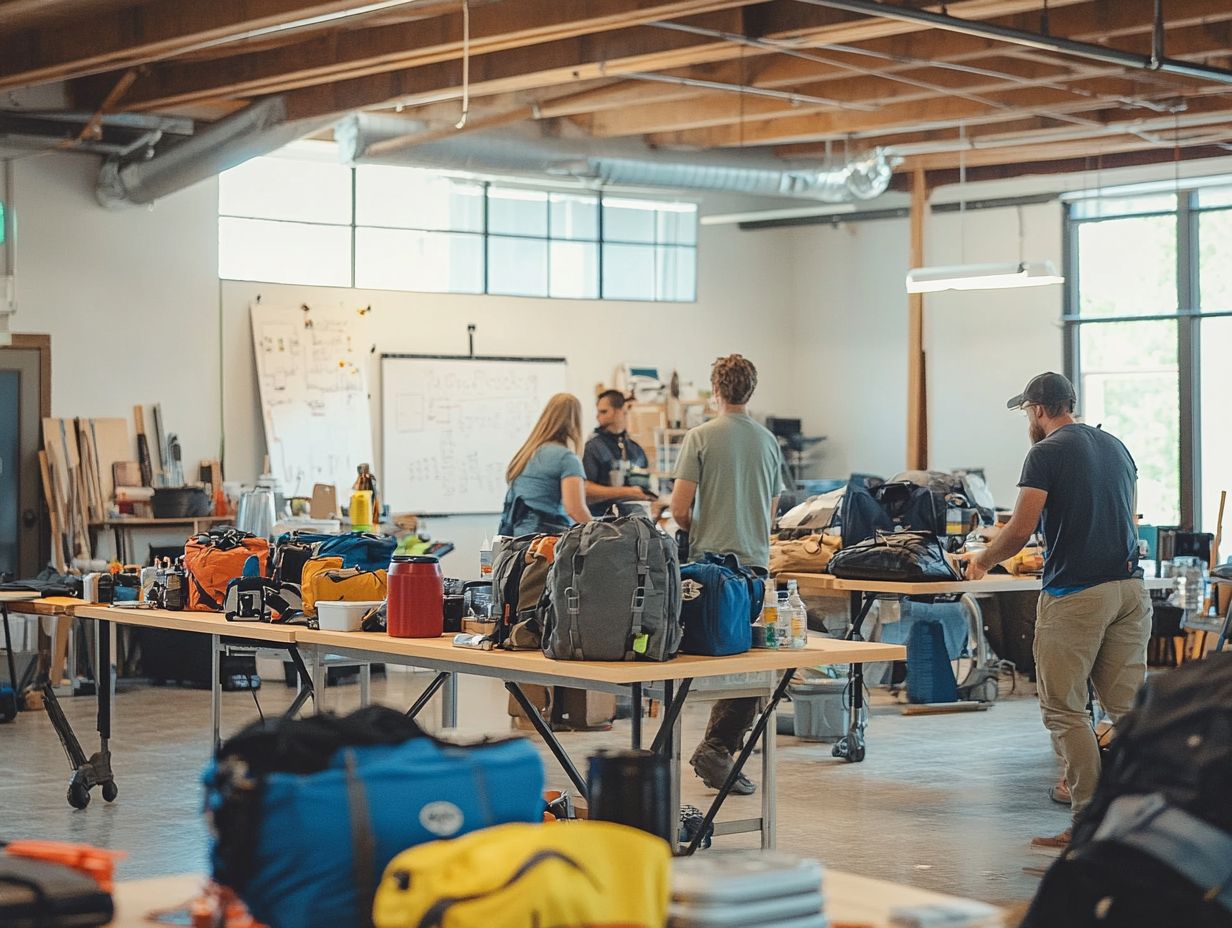
Selecting the perfect venue and date is crucial for a successful workshop! Consider factors like the size of the venue, its location, and availability.
- Check for potential conflicts with other local events.
- Choose a date that aligns with community needs and interests.
Understanding the community demographics is important in your venue selection process. Pick a location that is easily accessible for individuals with disabilities or those who rely on public transport to boost participation rates.
Don t overlook logistics; adequate parking space and facilities are crucial for accommodating various community members comfortably. This ensures consistent organization and chaos management.
Engaging local organizations and stakeholders can create a collaborative atmosphere, fostering interest and commitment to emergency preparedness initiatives.
By thoughtfully considering these aspects, you can cultivate an inclusive environment that encourages deeper community engagement and readiness in times of crisis.
Act now to secure your spot! Don t miss out on crucial preparation skills that could benefit you and your community.
Creating a Budget and Gathering Materials
Creating a budget and gathering materials are key steps for a successful Survival Gear Workshop. They greatly affect the event’s quality and participants’ experience.
A thoughtfully planned budget should encompass venue costs, materials, and supplies essential for hands-on demonstrations. This includes essentials like survival kits and emergency gear such as water purification tools, first aid kits, and other vital items like energy bars and MREs.
By taking this proactive approach, you ensure adequate preparation and allow for effective use of your resources throughout the workshop.
When budgeting, outline specific costs related to acquiring materials. Consider bulk purchases for items like flashlights, ropes, and portable stoves that participants will need during their training.
Plan the logistics for the workshop carefully, including transportation for equipment, rental fees for supplies, and catering for participants.
Using itemized lists to categorize tools can streamline costs and help with financial decisions. This ensures that all necessary items are secured while staying within financial constraints. By maintaining a clear overview of expenses, you can better allocate funds and avoid unexpected costs during the event.
Workshop Activities and Demonstrations
Workshop activities and demonstrations are essential for engaging you and creating hands-on learning experiences centered around survival skills and emergency preparedness strategies.
Offering practical demonstrations on organizing survival kits, managing emergency supplies, and responding effectively to various scenarios equips you with invaluable skills and builds confidence in your ability to handle crises.
This interactive approach enhances your learning experience and enables you to take ownership of your emergency preparedness efforts.
Hands-On Learning and Skill Building
Hands-on learning and skill building are the cornerstones of a Survival Gear Workshop. They enable you to actively engage with the materials and concepts at hand.
Through practical training sessions centered on survival gear organization and emergency planning, you ll acquire essential skills for effectively responding in crisis situations.
This experiential approach solidifies your knowledge and allows you to apply what you’ve learned in real-life scenarios, enhancing your overall preparedness.
Incorporating activities such as mock emergency drills, gear assembly exercises, and scenario-based problem-solving provides invaluable insight into the functionality and usage of various survival tools. This promotes survival gear organization and productivity.
These interactive experiences foster critical thinking and adaptability as you learn to navigate challenges in unpredictable environments. Techniques like team-building exercises further enhance your collaboration skills, enabling you to communicate and coordinate effectively during emergencies.
By immersing yourself in these hands-on activities, you boost your confidence and cultivate a deeper understanding of the principles behind successful emergency management. Ultimately, you transform theoretical knowledge into practical expertise, ready to tackle whatever comes your way!
Promoting and Inviting Participants
Effectively promoting and inviting participants to a Survival Gear Workshop is crucial for maximizing attendance and fostering community involvement. Implement targeted marketing strategies by leveraging social media, local community boards, and forging partnerships with relevant organizations to enhance your outreach efforts.
Clearly articulating the benefits of participation, such as acquiring essential survival skills and preparing emergency supplies for personal use, will attract a diverse audience eager to engage in emergency preparedness initiatives.
Marketing the Workshop and Reaching Out to Potential Attendees
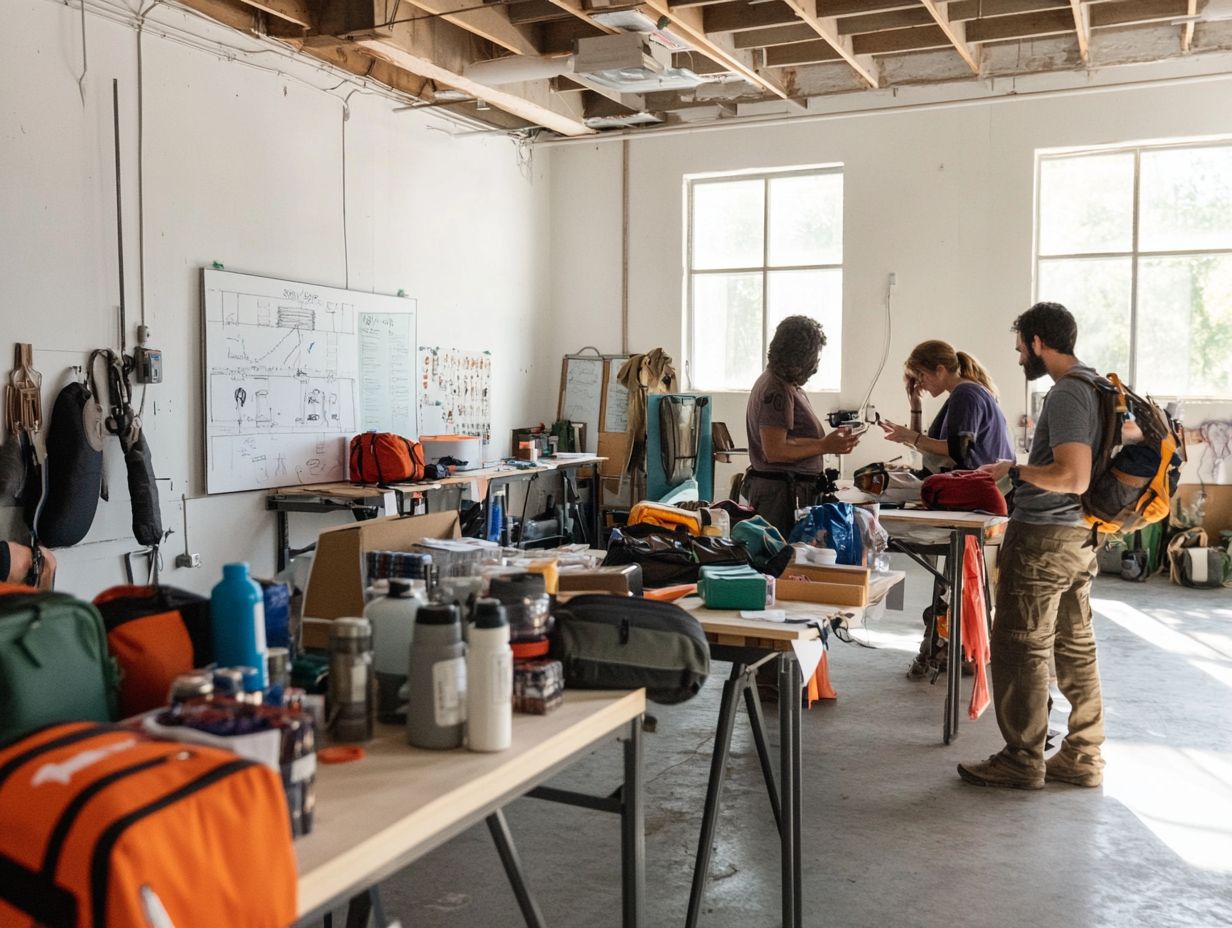
Effectively marketing the Survival Gear Workshop requires a keen understanding of ways to connect with your audience. Consider tactics such as crafting informative, visually appealing promotional materials and leveraging social media platforms.
Host introductory events to spark interest and boost participation. Reach out to potential attendees through connecting with local groups and emphasize the importance of being prepared for emergencies.
Utilizing platforms like Facebook and Instagram lets you run targeted ads that showcase success stories from previous workshops. You can also share testimonials from participants who have improved their survival skills.
Form partnerships with local community centers or survival clubs to offer free introductory classes. This can help build trust and foster connections.
Creating engaging content like video demonstrations of gear in action or infographics detailing essential survival tips can further pique interest. Use these engaging strategies to transform your workshop into an essential resource.
Post-Workshop Follow-Up and Resources
Post-workshop follow-up and resource sharing are essential for ensuring that you continue to benefit from your experience. Implement effective follow-up strategies like sending additional resources and organizing Q&A sessions.
Creating a community forum for ongoing education can cultivate a supportive environment for your continued learning. Encourage participants to share their perspectives and experiences to enrich the collective knowledge of the community.
Providing Additional Information and Support for Participants
Providing additional information and support after the Survival Gear Workshop is crucial for reinforcing what you’ve learned. This could include distributing online guides, access to webinars, and references to essential survival gear.
By creating an environment of continuous support, you re more likely to apply your newfound skills in real-world situations. Integrate tools that align with sustainable practices, such as eco-friendly emergency kits crafted from renewable materials.
Engaging with local community groups fosters a sense of belonging. You can share practical tips and access additional resources.
Numerous online platforms provide forums for discussion. These enable you to exchange experiences and strategies for disaster resilience.
Access to interactive mobile apps can help you track supplies, create emergency plans, and ensure you remain informed and ready for challenges.
Frequently Asked Questions
What is a survival gear workshop?
A survival gear workshop is a hands-on learning experience where participants can learn about and practice using various tools and equipment for survival situations.
Why should I organize a survival gear workshop?

Organizing a survival gear workshop helps individuals and groups become better prepared for emergencies or natural disasters. It can also be a fun and educational experience for all participants.
How do I choose the right location for a survival gear workshop?
The ideal location for a survival gear workshop is a spacious area with access to outdoor space for hands-on activities. It should have the necessary amenities, such as restrooms and parking.
Don’t miss out! Sign up today to secure your spot!
What activities can I include in a survival gear workshop?
Include hands-on activities like tool usage demonstrations and group discussions about emergency plans. Simulate survival scenarios to give participants real experience.
How can I ensure the safety of participants during the workshop?
Your safety is our number one concern! Have trained instructors, first aid kits, and clear safety protocols ready. Inform participants about risks and have them sign forms that protect you from legal issues.
Do I need to provide all the survival gear for the workshop?
It s a good idea to provide some basic gear, but you don t have to supply everything. Encourage participants to bring their own equipment or partner with a local store for rental options.

